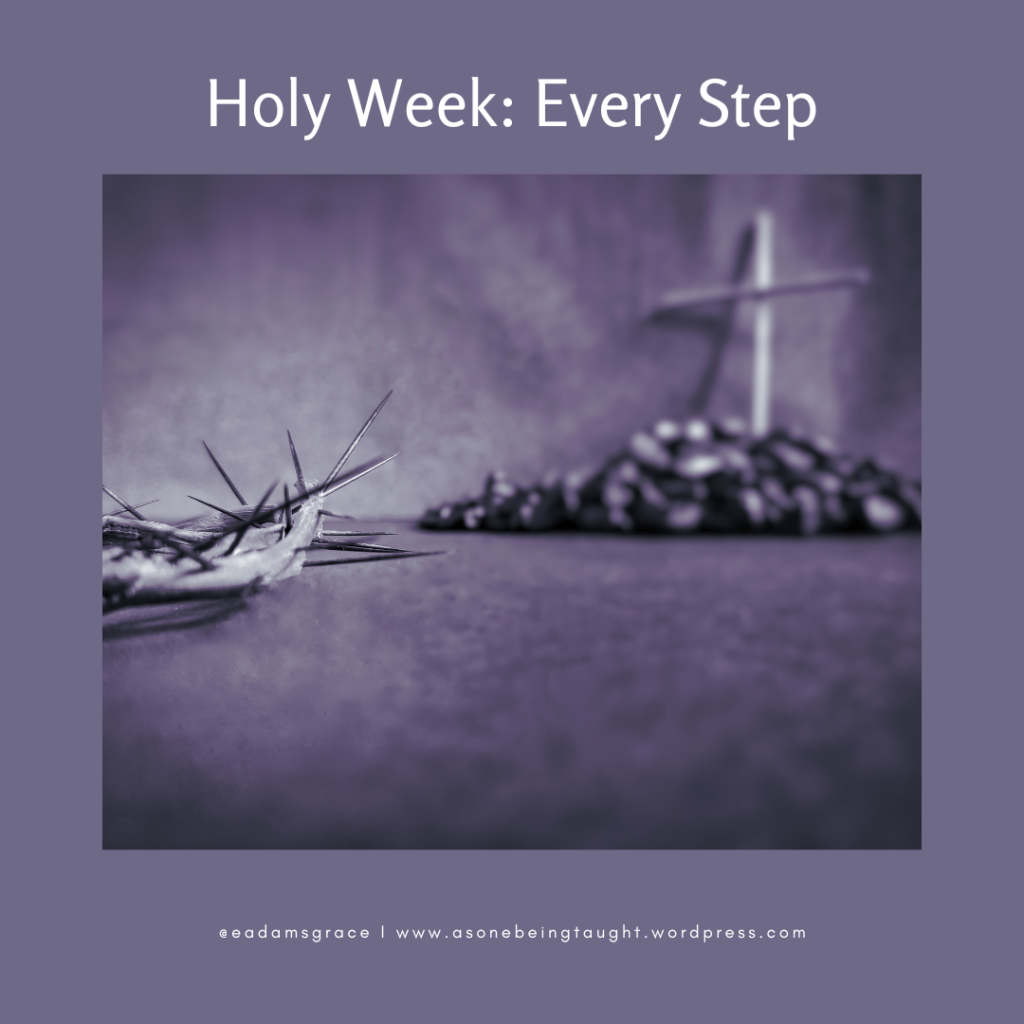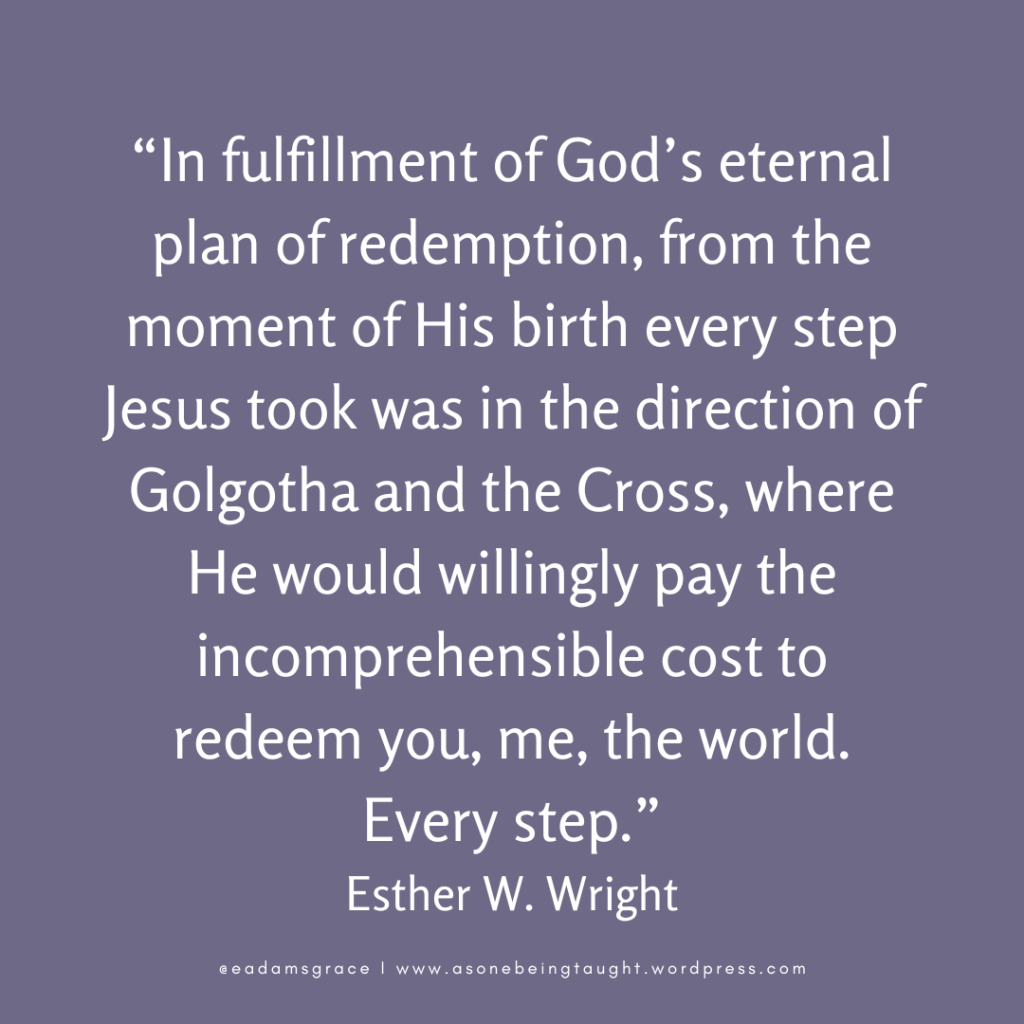

This blog post is based on Episode 6 of Season 11 of the Written Spoken Podcast. You can listen to the episode here or via the link shared at the end of the blog post. Unless otherwise stated, all Scripture references are from the NKJV.
Today we turn our attention to Holy Week which this year began on March 24 (Palm Sunday) and ends on March 30 (Holy Saturday).
We will read an excerpt of the apostle Luke’s account of the events of Palm Sunday, documented in Luke 19:37-42. After this excerpt, I will share a revised version of the blog post, “Every Step” which was originally published on this blog.
Before we begin reading, let us pray. Lord Jesus, this is a familiar passage of Scripture, but we want to afford it the reverence Your word deserves. Help us in this moment to be acutely aware of the truth that You, the Word through whom everything that is was made, became flesh to redeem us. It is in Your name we pray. Amen.
Luke 19:37-42:
“Then, as He was now drawing near the descent of the Mount of Olives, the whole multitude of the disciples began to rejoice and praise God with a loud voice for all the mighty works they had seen, saying:
“‘Blessed is the King who comes in the name of the Lord!’
Peace in heaven and glory in the highest!”
And some of the Pharisees called to Him from the crowd, “Teacher, rebuke Your disciples.” But He answered and said to them, “I tell you that if these should keep silent, the stones would immediately cry out.” Now as He drew near, He saw the city and wept over it, saying, “If you had known, even you, especially in this your day, the things that make for your peace! But now they are hidden from your eyes.”
Celebration and weeping both in the same event. Jesus accepted the praise and adoration, as was His due, riding in on the back of a colt, in fulfillment of the prophecy by Zechariah:
“Rejoice greatly, O daughter of Zion!
Shout, O daughter of Jerusalem!
Behold, your King is coming to you;
He is just and having salvation,
Lowly and riding on a donkey,
A colt, the foal of a donkey” (Zech. 9:9-10).
Jesus accepted the praise and adoration as was His due, but He also wept over Jerusalem (Luke 19:41-42). The God who is to be worshipped is also the God who weeps.
“Every Step”
The first chapter of the Gospel of Matthew documents the genealogy of Jesus, the Messiah, beginning with Abraham, the father of Isaac. Verse 17 states, “Thus there were fourteen generations in all from Abraham to David, fourteen from David to the exile to Babylon, and fourteen from the exile to the Messiah.” Forty-two generations.
Forty-two generations represent a large number of people, living life in all its dimensions: births, beginnings, endings, losses, victories, sickness, heartbreak, reconciliation, to name a few. And, encompassing all these numerous people and all their living, was the Omnipotent One, existing outside of time, but diligently, patiently, lovingly, meticulously working out in time and through humans, His eternal plan to redeem us, to bring us back to Himself.
Galatians 4:4-5 (AMP) notes, “But when [in God’s plan] the proper time had fully come, God sent His Son, born of a woman, born under the [regulations of the] Law, so that He might redeem and liberate those who were under the Law, that we [who believe] might be adopted as sons [as God’s children with all rights as fully grown members of a family].”
In fulfillment of God’s eternal plan of redemption, from the moment of His birth every step Jesus took was in the direction of Golgotha and the Cross, where He would willingly pay the incomprehensible cost to redeem you, me, the world. Every step.
The trip to Jerusalem at age 12, where, after searching for Him for three days, Mary and Joseph “found Him in the temple, sitting in the midst of the teachers, both listening to them and asking them questions,” astonishing all who heard Him (Luke 2:41-47). Every step.
To the Jordan River to be baptized by John (Matt. 3:13-17). Every step.
Into the wilderness to be tempted by Satan after fasting for 40 days and forty nights, meeting every temptation with “It is written. It is written. It is written” (Matt. 4:1-11). Every step.
Going from Nazareth to dwell in Capernaum by the sea in fulfillment of what was spoken by Isaiah the prophet (Matt. 4:12-17). Every step.
Walking by the Sea of Galilee on numerous occasions such as when He called the first disciples, Simon Peter and his brother Andrew, then two other brothers, James and John, the sons of Zebedee (Matt. 4:18-22). Every step.
At the wedding in Cana of Galilee where He, the true Vine, turned water into wine performing His first recorded miracle in response to His mother’s appeal (John 2:1-11). Every step.
Going about “all Gailee, teaching in their synagogues, preaching the gospel of the kingdom, and healing all kinds of sicknesses and all kings of disease among the people”(Matt. 4:23). Every step.
Up on a mountain where He taught his disciples many things, including what we know as “The Beatitudes” (Matt. 5:1-12), how to pray (Matt. 6:9-13), and the requirement that we must forgive if we want to be forgiven (Matt. 6:14-15). Every step.
In Capernaum, where He spoke the word that healed the centurion’s servant and drove the fever from the body of Peter’s mother-in-law with a touch (Matt. 8:5-15). Every step.
To the country of the Gergesenes where He set two demon-possessed men free (Matt. 8:28-34). Every step.
To the house of Jairus where He raised Jairus’ twelve-year-old daughter from the dead (Luke 8:41-56). Every step.
Through Samaria and to the Samaritan woman who came to draw water and met the Messiah, the Living Water (John 4). Every step.
To the tomb of Lazarus where He wept then unquestionably demonstrated that He is the Resurrection and the Life (John 11:1-44). Every step.
Into the temple where, in righteous anger, He drove out all those who bought and sold in the temple, overturned the tables of the money changers and the seats of those who sold doves, and He said to them, “It is written, ‘My house shall be called a house of prayer,’ but you have made it a ‘den of thieves ‘” (Matt. 21:12-13). Every step.
To the Upper room where He instituted The Lord’s Supper (Mark 14:22-25), washed His disciples’ feet, including the feet of the one who would deny Him and the other who would betray Him, and instituted a new commandment (John 13:1-35). Every step.
Into the Garden of Gethsemane where He wrestled with the will of the Father, in agony to the point that His sweat became like drops of blood, while His disciples slept instead of praying and keeping watch with Him (Mark 14:32-41; Luke 22:39-46). Every step.
Also, there in the Garden of Gethsemane, He stepped forward to those who came with Judas, His betrayer, to arrest Him and asked, “Whom are you seeking? Then responding, “I am He,” allowing Himself to be arrested and bound and led away first to Annas, the father-in-law of Caiaphas the high priest (John 18:1-14). Every step.
Then later to Pilate who would ask Him several questions, declare that he found no fault in Him at all, but still condemn Him to death, have Him scourged, and delivered into the hands of those who would crucify Him (John 18:28-40). Every step.
To a hall called Praetorium where a garrison of soldiers would twist a crown of thorns, put it on His head, strike Him, spit on Him, and mock Him (Mark 15:16-20 NKJV). The prophet Isaiah informs us that “His visage was marred more than any man, And His form more than the sons of men” (Isa. 52:14 NKJV). Every step.
Carrying His own cross until Simeon the Cyrenian was commandeered to help Him (Mark 15:21 NKJV). Every step.
Up Gologota’s Hill to allow His hands and feet to be nailed to a cross, offer salvation to a condemned thief, and cry out in agony, “My God, My God, why have You forsaken me,” before commending His spirit to His Father (Matt. 27:46; Luke 23:32-46). Every step.
His body would be removed from the cross and placed in a borrowed tomb (Matt. 27:57-61). We know that is not how His story ended but let us not be in such a hurry to get to Resurrection Sunday that we rob ourselves of the transformation that can come as we take the time this Holy Week to reflect deeply on what God did to redeem us. As we walk through this Holy Week, may we see with fresh eyes, hear with open ears and hearts, and worship. This Holy Week, let us pause, repent, give thanks, worship and position ourselves to truly celebrate Him, the One who loved us enough to make Himself the Offering necessary to redeem us.
